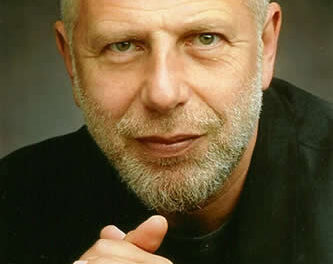In this age of giant boxes passing for theaters, seeing the two productions by Dublin’s Gate Theatre in the small “real” Playmakers hall has been a startling pleasure. The modest stage, narrow but deep, like the building, is perfect for the kind of intimate, word-based theater Carolina Performing Arts presented with The Gate. Sound quality is good, and the compact stage area makes the emotions provoked by Samuel Beckett’s writing all the more explosive. Watt, the first night’s offering in the four-day run, was easy and playful compared to the second: Beckett’s comfort-stripping Endgame, brilliantly played to the last freeze-frame by Barry McGovern (Clov) and Owen Roe (Hamm), with sidelight cast by Rosaleen Linehan (Nell) and Des Keogh (Nagg). Alan Stanford directs the well-paced production.
The thing I didn’t know when I read the play many years ago and found it sour and depressing — unbelievable, really — was that this is how it is. This is exactly how it is. People get old, they can’t stand (like Hamm) or can’t sit (like Clov), or get their legs cut off altogether and are consigned to the dumpsters of life (like Hamm’s parents). We lose vision, hearing, mobility; we lose memory and descend into repetition — but we never lose pain. Finally we lose patience with the whole game and with whatever it is that is “taking its course.” The story ends, or rather, we leave the story. We die.
It’s the getting to death–the putting it off, the spinning out of the story a little longer, and then the stopping of it, which Endgame addresses. We talk so casually now of “end of life issues” and “end of life advanced directives” and “comfort care” but few will take on these topics in clear pitiless language. Our family and friends “pass on” or maybe they “go to be with the Lord.” In fact, we don’t know what happens, and Beckett won’t let us forget it. People die, usually having a tough time along the way. They leave us. That much we know.
Aspects of my personal life at the moment made me particularly susceptible to the power of this play: I left the theater feeling beaten and then skinned. But also relieved. What a relief to not have to put up a good front! What a relief to be freed for 90 minutes of euphemism and sentimental prevarication and delusional optimism. What a relief to laugh out loud at the absurdity of the passing situations between our coming in and going out. Only the best actors and directors can handle material like this effectively — theatre-makers who can stay out of their own way, subdue themselves to the play, and tell the truth in a small room.
Note: This production will be repeated on November 5. For details, see the sidebar.











